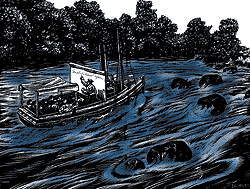 The race to beat the budget freeze has once again taken over the streets of Kathmandu. Agencies of different municipal services are vying with each other to dig up roads in the middle of the monsoon with a zeal seldom seen at any other time except during SAARC Summits.
The race to beat the budget freeze has once again taken over the streets of Kathmandu. Agencies of different municipal services are vying with each other to dig up roads in the middle of the monsoon with a zeal seldom seen at any other time except during SAARC Summits. The gaping hole in front of the finance ministry shown in this paper last week is not an oddity. Similar craters have erupted all across town. Men at work: digging and then covering up. Their reason is that the budget was released too late to do anything about it.
The same excuse, however, doesn't hold for the annual power shutdown caused by the Machendranath Rath procession. Its route is fixed, the duration is known in advance, and the date of pulling the juggernaut is common knowledge. Yet, year after year, the Nepal Electricity Authority shuts down power supply citing the Rath. If the procession is so regular, what has the electricity agency done to spare its clients from the annual ordeal?
The route, the schedule and the operation of the Machendranath procession is better organised than the modern services (electricity, traffic, pedestrian, shopping) that it disrupts. Planners of the Malla period seem to have paid closer attention to civic amenities because citizens were better aware of their rights and responsibilities. Since the rulers themselves took personal interest in civic affairs, service delivery was more effectively coordinated. In contrast, city life in our times seems to sway with the whims of several little tyrants at the controls of the service infrastructure, often working at cross purposes.
Today, it needs a letter to a local daily from a resident southeast Asian ambassador to get the Maharajganj road repaved.
Most city dwellers have no water supply, sewers overflow, the rivers have died, and tankers supplying turbid water at exorbitant prices do a roaring business. But there are no street protests. If freedom is when people can speak and democracy is when the government listens, then we don't have either.
The state is now just a necessary evil, one that has absolved itself of all public responsibilities: security, health, education and physical infrastructure. There are several causes behind this deplorable state of civic affairs, the main one being a lack of coordination between different agencies involved in service delivery. There is an urgent need for someone who dares to say: "The buck stops here."
The Kathmandu Valley badly needs a Regional Commissioner to take charge of law and order, coordinate the efforts of line agencies, have a vision for future development, and supervise projects to increase their effectiveness. The three DDCs, five municipalities and scores of VDCs in the valley have their roles, but a unity of command must be created if the capital valley is to be governed as one effective administrative unit.
A powerful regional bureaucrat can remind us of the Anchaladhish of yore who reigned over the zone under his command as the crown's direct representative. However, the office of the regional commissioner need not be as autocratic. With certain precautions, it can be made a democratic institution addressing the needs of administrative decentralisation.
To make the office of commissioner answerable to people's representatives, a regional council can be set up through a simple constitutional amendment requiring two-third's majority of the lower house of parliament. It can be formed without undermining the primacy of local government units if it is to be composed of the representatives of VDCs, municipalities, and DDCs in the valley.
A regional commissioner made answerable to a body of indirectly elected people's representatives is unlikely to raise the hackles of political parties. They may even see it as an opportunity to transfer blame for politically inconvenient decisions that need to be taken.
If such a model works in the valley-there is no reason why it shouldn't-it can then be easily replicated in all other development regions of the country. Instead of a ceremonial regional administrator in a flagged limousine, it would be more effective to turn the post into a constitutionally-mandated one and make the person answerable to the indirectly elected regional body composed of the representatives of all local government units.
The government at the centre can appoint regional commissioners for a fixed term-but the person will have to function in such a way that she or he is not removed through a no confidence motion in the regional council. Regional commissioners can become a bridge between the field and the centre. They may not be able to solve all the problems created by the line agencies, but at least they can listen to public complaints about pot-holed streets. After that, getting the holes fixed shouldn't be that difficult.



